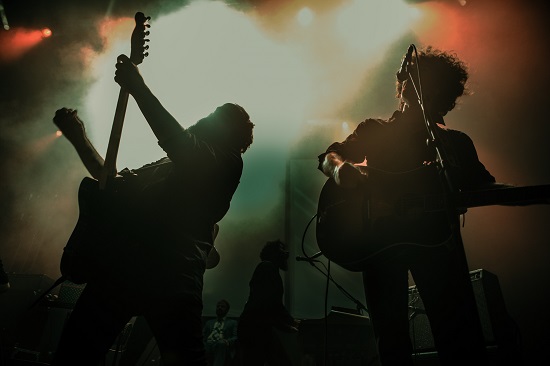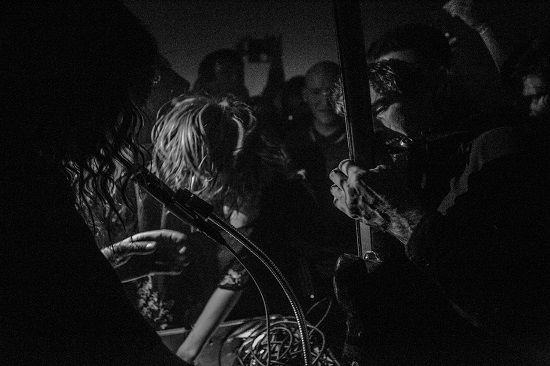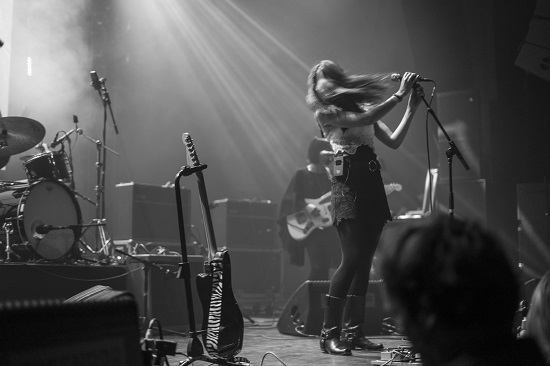Josefin Öhrn – photo by Lilly Creightmore
Fuzz Club, organised by the label of the same name in partnership with Eindhoven Psych Lab, in that city’s imperious Effenaar venue, is ostensibly a ‘psych fest’. It’s a little steelier than most, perhaps – there is more psychedelia of the skull-crushing, motoric and guitar-based variety than there are whacked-out interdimensional synth voyages – but psychedelia it remains.
In the wider world, psych is somewhat on the wane in 2018, having hit a soaring high four or five years ago. In my then-native Liverpool, the annual International Festival of Psychedelia – one of Europe’s largest – was the undisputed daddy of the Scouse music calendar, a cosmic celebration imbued with a sense of starry-eyed optimism, a friendliness and community spirit.
Liverpool Psych Fest is “taking a break” this year. If it does return, in an area of the city increasingly ravaged by boneheaded ‘redevelopment’ projects in the time since, it’s not a given that they’ll recapture that spirit. The utopian vibe has been eroded in recent months, not just in Liverpool Psych Fest but in the United Kingdom. With the musical cycles seeing psych’s popularity on the wane once more, and many of its most accomplished forerunners now established enough that their ideas are less and less surprising, it’s harder to get excited about a new entrant to that scene.
Thank God that in Eindhoven’s Effenaar, a former linen factory now transformed into one of Europe’s most well-regarded venues, we find a stronghold of what a psych fest should be. It’s a reminder that there’s still excitement to be had in getting off your face to unusual noises played very loudly.
As we arrive, German two-piece Pretty Lightning are already in mid-groove on the smaller of the festival’s two stages, thrusting their way through a set of no-nonsense cosmic thumping. Within a few minutes, as we see them hit a particularly rich vein of slick and sleazy intergalactic groove, slathered in gritted-teeth riffs, we’re transported straight back into that old psych-head mindset. Then, upstairs in the much larger, wider main room, Dead Rabbits are unfurling a deep, foggy cloud of beefy shoegazing fuzz.
If those opening salvos make it sound as if Fuzz Club is just a revival for the trippers who refuse to come down, Josefin Öhrn, who follows on the main stage, proves that there’s still room to stretch the possibilities. Öhrn stands centre stage, silhouetted by lights and surrounded in smoke, rooted to the spot as she and her band produce a sweet, glistening sonic sweep. It’s gentle, but somehow still powerful, never soft or easy but uplifting and transporting. She is the first to prove that psychedelia’s light is far from extinguished.

The Limiñanas – photo by Anna Louise Yorke
Ulrika Spacek, downstairs, are more melodic but similarly progressive when it comes to the state of the scene. They offer tightly wound duels of guitar, weaving their way in and out of ceaseless pumps of drum and chiming with a supreme, fuzzy cool. Then, Ron Gallo follows them with what’s possibly the set of the weekend. Gangly, clean shaven and with a mop of curly brown hair buried under his baseball cap, he stands out physically as well as musically on the line-up, his set simmering with tension, energy and frenetic jabs of guitar.
Upstairs, meanwhile, A Place To Bury Strangers are gearing up to deliver a headline slot for the ages. They start, it’s fair to say, strong, launching into the supercharged industrial blast of ‘We’ve Come So Far’ to a relentless flash of strobing light. Within seconds they’re already smashing up their instruments as their chaotic, deranged attack of noise gets more and more intense. It’s frantic and violent, like a supergiant star collapsing into itself and exploding into a supernova. What’s more extraordinary still is that after starting at what seems like a breaking point, they teeter brilliantly on its edge for the entire set, never tumbling, embracing the chaos.
Catching our breath in the aftermath, we meet a wizard named Chris, who has spent the majority of the festival without shoes on, chewing an ancient stick, drawing cryptic runes on his arms and hula-hooping. He guides us back downstairs to see Glaswegian maniacs The Cosmic Dead, who keep up the intensity with a pummelling, shuddering set of sludgy power. Chris disappears back into the ether as we power onwards still into the early hours, Desert Mountain Tribe’s colossal riffage carrying Fuzz Club ever forwards past three in the morning. So endeth the first day.
Stumbling across town on the 50-minute walk to our hotel, save for a few distracting Dutchmen suggesting strongly that we take their bike, and some remarkably friendly scallys who invite us to join them drinking their dad’s vodka by the canal (we decline on both counts), we’re left to ponder an extraordinary first day in Eindhoven. Fuzz Club is one of those festivals where atmosphere is essential, not just of the brain-expanding kind, but of the simple kind. To put it plainly, everyone is really nice, and the music is really good. It is some feat not only to recapture some of that joyous, cosmic optimism that defined the psych festivals of half a decade ago, but to entirely reignite it.
We arrive for the second day via the back entrance, through the Effenar’s spacious garden which is picturesque in a brutalist sort of way with the venue’s Modern Movement shadow cast over a pond overgrown with reeds. Easing our way back in with a veggie burger, The Oscillation’s louche and lopsided krautrock from a wonkier parallel universe, and Sonic Jesus’ dark and swarming gothic pump – to whom one unfortunate reveller headbangs so hard he cuts his forehead on a speaker – we’re back on our feet.

A Place To Bury Strangers – photo by Anna Louise Yorke
The Wands delight their crowd in the smaller downstairs space, a room that can simmer with excitement when it’s packed to the rafters, with a set that recalls a clash of Pebbles/Nuggets fug and proggier, melodramatic sensibilities. Gnod’s R&D set, meanwhile, is a colossal, searing tsunami of outrageously loud noise, crashing again and again with merciless intensity that’s enough to make the Effenaar’s foundations creak.
It is upstairs, however, that the venue’s beating heart is contained. The Limiñanas make up for a lengthy delay at soundcheck with a glorious performance there, both saucy and self-deprecating, lush, heavily accented French monologues lilting over wicked basslines and thudding grooves as a man dressed in a business suit dances awkwardly at the back of the stage. The Black Angels are the weekend’s second headliners, meanwhile. They’re the band many are here specifically to see, based on the results of ‘who are you looking forward to’ small-talk in the courtyard, and open with their biggest hit, the gargantuan ‘Young Men Dead’. They’re a band that, however popular, the critics have been somewhat reluctant to embrace, but live it’s impossible to dismiss them as the formulaic riff-merchants that their detractors often make them. Their set carries a certain dark energy that cannot be obtained by any formula; as the screens behind them spiral, ebb and flow as those wicked, fuggy riffs descend and descend, Alex Maas’ vocals riding with a triumphant wail over the top.
In their self-titled festival, Fuzz Club deliver a fierce, defiant rebuke to the idea that this kind of music, and this kind of festival is on the wane. It feels appropriate that two of their own should close it, in the shape of Portuguese drone warriors 10,000 Russos – who are bizarre and excellent in equal measure – and Eindhoven’s own RMFTM (formerly Radar Men From The Moon), who send off the festival with one final, heady trip on the main stage. The two bands recently collaborated on a superb LP for Fuzz Club, and here they are the proof (that by now really isn’t needed), that the label are equally adept at putting together a small festival full of immense joy, pleasure and power.


